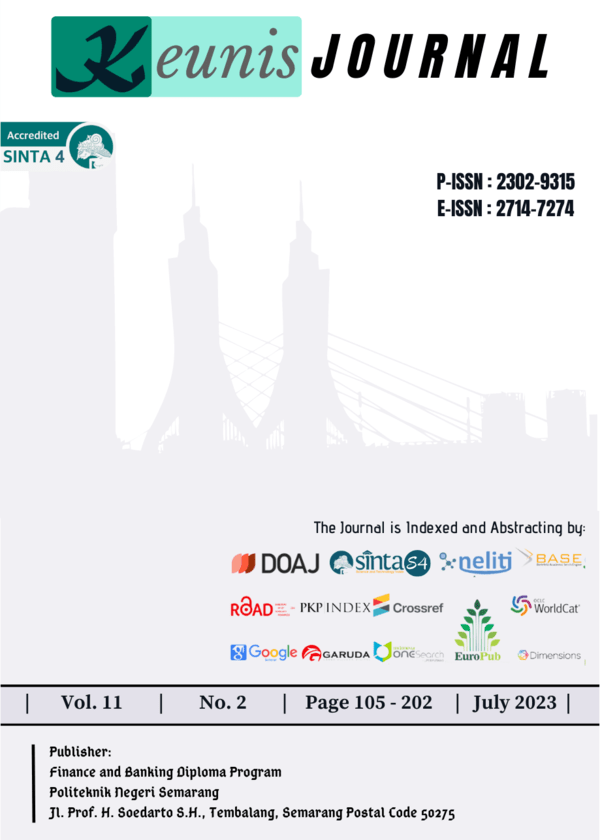ANALYSIS OF THE IMPLEMENTATION OF MICRO, SMALL, AND MEDIUM ENTITY FINANCIAL ACCOUNTING STANDARDS AND ITS IMPACTS ON THE FINANCIAL REPORT QUALITY OF SMALL AND MEDIUM-SIZED ENTERPRISES
DOI:
https://doi.org/10.32497/keunis.v11i2.4504Keywords:
MSME Actors, Credit, Financial Statements, SAK EMKMAbstract
This study aims to identify the perception of entrepreneurs regarding the Importance of bookkeeping and financial report related to Amountount of credit received by MSMEs, as well as the prospects for implementing the Financial Standards for Micro, Small, and Medium Entities (SAK EMKM), and their impacts on the quality of MSMEs financial reporting. This study used primary data collection by using questionnaires. Questionnaires were distributed using the purposive sample method, with MSMEs spread across the Banyumanik and Tembalang sub-districts as samples. Were 40 questionnaires sent directly to the selected MSMEs as Amountount of evidence adequacy? An in-depth review was conducted on the MSMEs chosen to complete the data and discussion. The provisions of MSMEs are business actors who have been running for more than two years and have applied for bank credit financing. Respondent data can be processed in 32 respondents. The analytical technique used is the Hypothesis Testing Model by Rizki (2012). The analysis technique used is multiple regression analysis. The hypothesis test results showed that nine hypotheses were accepted, and five were rejected. It was found that educational background contradicted the Importance of bookkeeping and recording SAK EMKM financial statements.
References
Agustine dan Kristaung. (2013). Metodologi Penelitian Bisnis dan Akuntansi. Jakarta: Dian Rakyat
Divianto, dan Febriyanty. (2017). Pengaruh Pemahaman Pelaku UKM dalam menyusun laporan keuangan terhadap impementasi laporan keuangan berdasar SAK ETAP dengan persepsi pelaku UKM sebagai moderating variable. International Jurnal of Social Science and Busines. Vol. 1, No. 1, 166-176
DSAK IAI. (2016). Standar Akuntansi Keuangan Entitas Mikro, Kecil, dan Menengah (SAK EMKM), Ikatan Akuntan Indonesia.
Prajanto, A dan Septriana, I. (2018). Implementasi Penerapan SAK EMKM serta Dampaknya pada Kualitas Pelaporan Keuangan UMKM. Aset. Vol. 20 No2. 79-89
Marliyati, Nikmatuniayah. (2010). Kaji Tindak Penyusunan Sistem Informasi Akuntansi bagi UKM Produk Kerajinan Batik sebagai Acuan Pengembangan Kurikulum Program Studi Akuntansi.Laporan Penelitian. Politeknik Negeri Semarang.
Marliyati, Nikmatuniayah.(2016). Kaji Tindak Industri Kreatif Sebagai Komoditas Unggulan Pemerintah DaerahDalam Menghadapi Asean Economic Community Di Jawa Tengah. Penelitian Terapan Unggulan Perguruan Tinggi. Politeknik Negeri Semarang.
Murniati. (2002). Analisis Faktor-Faktor yang Mempengaruhi Penyiapan dan Penggunaan Informasi Akuntansi pada Pengusaha Kecil dan Menengah di Jawa Tengah, Tesis, Universitas Diponegoro, Semarang
Pinasti, M. (2001). Penggunaan Informasi Akuntansi dalam Pengelolaan Usaha Para Pedagang Kecil di Pasar Tradisional Kabupaten Banyumas. Jurnal Ekonomi, Bisnis, dan Akuntansi .I(3)
Rudiantoro, Rizki dan Siregar. (2012). Kualitas Laporan Keuangan UMKM dan Prospek Penerapan SAK ETAP. Jurnal Akuntansi dan Keuangan II (9). 1-12
Salmiah, Neneng. et al. (2015). Analisis Penerapan Akuntansi pada UMKM Binaan Dinas Koperasi dan UMKM Kota Pakanbaru dan Kesesuainnya dengan Standar Akuntansi Keuangan Entitas Tanpa Akuntabilitas Publik (SAK ETAP). Jurnal Akuntansi: Media Riset dan Akuntansi Keuangan. Vol 3 No 2 Tahun 2015
Saragih dan Surikayanti. (2015). Analisis penerapan akuntansi dan kesesuaiannya dengan SAK ETAP pada UKM Medan Perjuangan. Prosiding Seminar Nasional Ekonomi Manajemen dan Ekonomi. https://jurnal.umsu.ac.id/index.php/kumpulandosen/article/view/2482/pdf_578
Sholikin A dan Setiawan A. (2018). Kesiapan UMKM terhadap Implementasi SAK EMKM. Journal of Islamic Finance and Accounting. Vol 1 No2. 35-50
Tatik. (2018). Implementasi SAK EMKM (Standar Akuntansi Keuangan Entitas Mikro Kecil dan Menengah) pada Laporan Keuangan UMKM. Jurnal Relasi. Vol. XIV. No. 02. 1-14
Downloads
Published
How to Cite
Issue
Section
License
KEUNIS is licensed under a Creative Commons Attribution-ShareAlike 4.0 International License.
Authors who publish with this journal agree to the following terms:
- Authors retain copyright and grant the journal right of first publication with the work simultaneously licensed under a Creative Commons Attribution-ShareAlike 4.0 International License that allows others to share the work with an acknowledgement of the work's authorship and initial publication in this journal.
- Authors are able to enter into separate, additional contractual arrangements for the non-exclusive distribution of the journal's published version of the work (e.g., post it to an institutional repository or publish it in a book), with an acknowledgement of its initial publication in this journal.
- Authors are permitted and encouraged to post their work online (e.g., in institutional repositories or on their website) prior to and during the submission process, as it can lead to productive exchanges, as well as earlier and greater citation of published work (See The Effect of Open Access).






